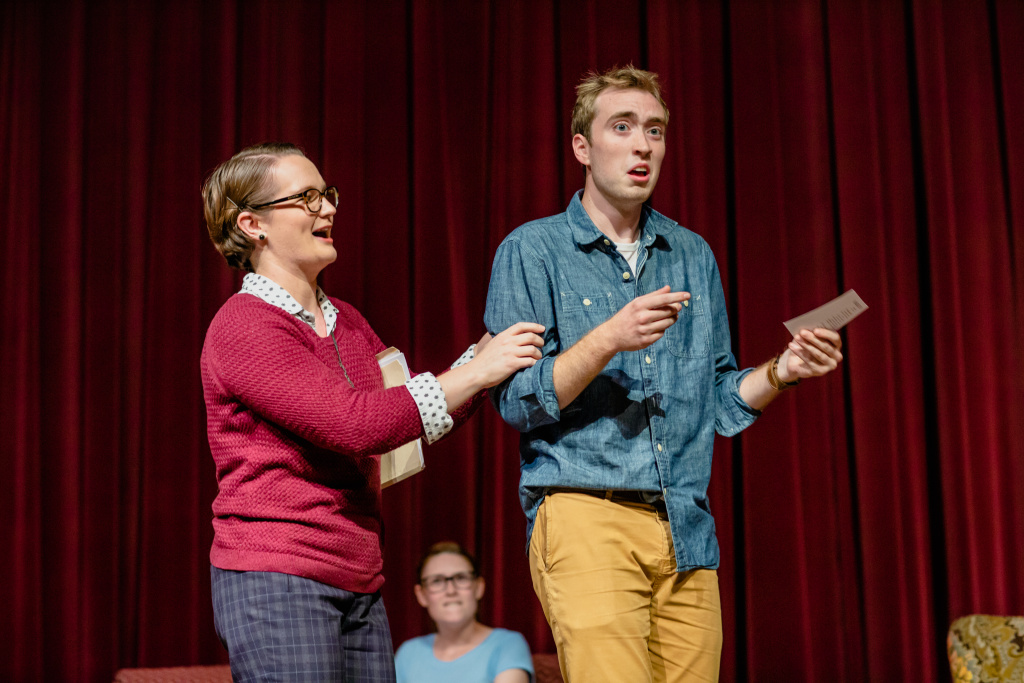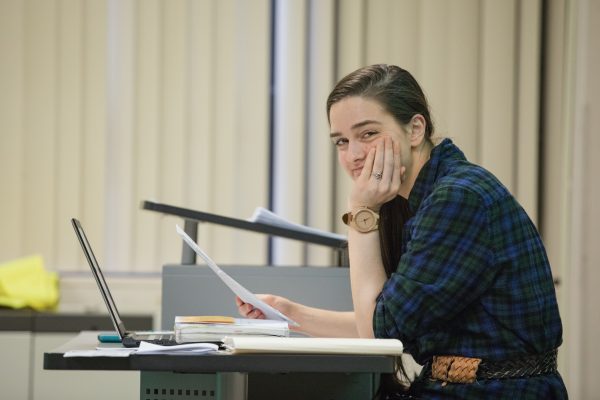The spring Theatre Bake-Off kicks off second semester’s theatre season. For 10 years the playwriting festival has invited campus family and friends to enjoy four original plays written, directed and performed by university students in only 24 hours. But this BJU tradition has evolved significantly since 2009.
Looking for Quality
Over a decade ago, Ron Pyle—head of the theatre department—and former theatre faculty David Schwingle were concerned with the lack of Christian-authored original plays. The number of published pieces that matched their vision was limited. “We wanted to encourage Christian people who have talent to write plays so that we’d have stories to tell that were consistent with our worldview,” said Pyle.
They began a playwriting competition open to any Christian writer. Over the course of a six-month period, writers could submit one-act plays that Pyle and Schwingle evaluated. Unfortunately, the number and quality of submissions were low. Schwingle had experienced a 24-hour playwriting competition during his graduate studies and proposed trying something similar. “The idea was to identify who the writers were and to try to encourage them to write more,” said Pyle. “Somebody who writes a great 10-minute play can probably write a longer play, too.”
Proofing the Dough
During the fall of 2009, students were encouraged to participate in this 24-hour competition. “The first Bake-Off was crazy,” said Schwingle. Writers were called on a Wednesday evening and assigned random characters, props and lines to include in their 10-minute plays. Twelve plays were submitted 24 hours later. On Friday evening, Pyle and Schwingle announced the four winning plays, which actors and directors rehearsed Saturday morning and performed that same night.
“The students couldn’t believe we would really perform new plays from memory,” Schwingle added. “But when the plays were pulled off and the audience applauded, everyone realized what they could do in just 8–12 hours.”
That first Bake-Off had an audience of 75. But, according to Pyle, the event “sort of took on a life of its own.” The faculty didn’t expect people outside of their department to take an interest, but the audience grew every semester. Today, about 500 people enjoy each new version of the show. The number of writers has grown, too. Current Bake-Offs receive between 30–40 manuscripts, which a team of graduate assistants evaluate.
Tasting the Product
Though playwrights were the original focus of the Bake-Off, the event benefits all of its members. “It’s a way to experience the entire playwriting and theatre-making process in a microcosm,” said Schwingle. “It’s a sort of stress test for artists.” Everyone participating must put away their excuses and make an effort to deliver on time.
The limited time teaches both actors and directors to not overthink. “Sometimes when you’re working on something for two months you get so used to it or you think so much about it that you make it more difficult than it is,” said Pyle. The air of spontaneity and improvisation that comes with the Bake-Off plays helps the students trust their ability to remember their lines under a time crunch.
Acting in the Bake-Off can also be quite entertaining. “I was turned into a potato one year,” said theatre GA David Veatch. Apparently, during a play about a narcoleptic angel, Veatch’s character was turned into a potato by a demon. “I don’t exactly remember what was all happening, but for (one-third) of the play my character was a literal potato on stage.”
See also: Senior Spotlight: Life Lessons on the Stage, Screen and in Classroom
Though he considers it a great challenge, Veatch enjoys the Bake-Off writing the most. “You don’t know what you will have to include in the play until you go to the meeting, and to see uncommon advantage: a chance to see their work on stage, an opportunity to test what you can do with that is a lot of fun.” Writing for the show also gives playwrights an opportunity to hone their skills and a place to learn from success and failure.
If you’re interested in writing for this semester’s Theatre Bake-Off, attend the meeting at 5 p.m. Jan. 22 in Performance Hall. Actors can email the producers by midnight on Wednesday and will receive casting confirmation when the plays are picked. Come enjoy the final product at 7 p.m. Jan. 25 in Performance Hall. Tickets will be sold at the door for $3.








